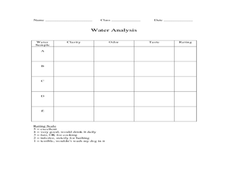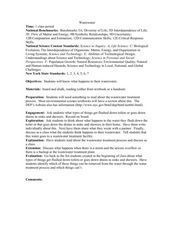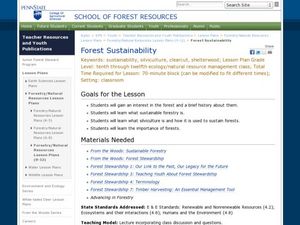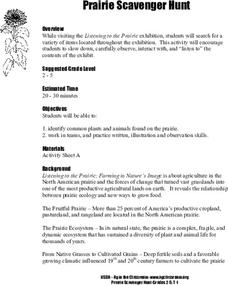Curated OER
Bottled Water vs. Tap Water
Learners analyze the similarities and differences between tap water and bottled water. They make informed decisions about their use of each. Students are asked if they drink mostly tap water straight from the tap or water fountain. They...
Curated OER
Wastewater
High schoolers discuss what happens to their wastewater. They read about the wastewater treatment process. Students are asked what types of things get flushed down toilets or goes down drains in sinks and showers. They are taught what...
Curated OER
Great Rivers 2: The Ups and Downs of River Flooding
Second in a three-part lesson on rivers, this lesson focuses on the flooding that occurs in riparian locations. First, learners take a look at facts about the Amazon River. They read online materials and fill in a worksheet as they...
Curated OER
Ecosystem Services - Water Purification
Students see that ecosystems provide services to people that are essential to life as we know it. Reporters (drops of water) could interview the trees and soil in the surrounding ecosystems for news stories on how they helped keep the...
Curated OER
Water Purification
Students use the example of natural water purification to show that healthy ecosystems provide services to people that are essential to life as we know it.
Curated OER
Dependence and Interdependence
Third graders explore the dependence and interdependence that plants and animals in every environment have on one another. They examine how plants and animals depend on each other for survival. Students complete a variety of experiments...
Curated OER
Forest Sustainability
High schoolers study major forests and their history. They see what sustainable forestry and silviculture is and discuss the topics on the attached worksheet.
Curated OER
Wild Dog Debate
Learners participate in a mock conference addressing the possible extinction of African wild dogs. In this wild dogs lesson plan, students state their arguments and ask questions about the issues they have researched.
Curated OER
Renewable vs. Non-Renewable Resources
Here's a fine lesson on renewable and non-renewable sources of energy for your 5th graders. In it, learners list a number of natural resources on the board, then try to sort the resources into appropriate categories. This helps them to...
Curated OER
Exploring Ecosystems
Students examine the relationships between plants, animals, and the environment in ecosystems. They sort animal cards, collect natural materials from the schoolyard, and record an ecosystem web in the form of a poster.
Curated OER
Who Takes Care of the Maya Forest Corridor?
First graders explore the work of conservationists and how they make sure animals and people are safe in their habitats. They identify the rules, laws, jobs, and people who help them feel safe and keep them healthy. Students explore who...
Curated OER
Bioethics
Students are introduced to the issues surrounding bioethics and begin to discover how some of these values can influence decision making. The exciting part of this lesson is the constructivist method used to engage students of all...
Curated OER
Aquatic Exotics
Students identify and describe the aquatic exotic species found in Illinois. Using the internet, they research the species origins and discover their effects on native species in the area. They discuss how appropriate it is to introduce...
Curated OER
Urban Ecosystems 4: Metabolism of Urban Ecosystems
Cities are compared to living, breathing, metabolizing organisms. Fourth in a five-part series of lessons, this one focuses on the flow of materials through a city. Links to interesting websites and images make your delivery of...
Curated OER
Use of the Forest in the Economic Evolution of Oakville, Pennsylvania
Students explore forest usage and the ways which it affected the development of Oakville. They identify the technological advances that shaped forest based industries, and the current challenges facing the community of Oakville.
Curated OER
Prairie Scavenger Hunt
Here is a simple lesson for young learners on the plants, animals, and flowers found in the prairie environment. There are worksheets embedded in the plan that pupils use once a teacher-led discussion and demonstration has taken place....
Curated OER
Prairie Scavenger Hunt
Students search for a variety of items while visiting a Listening to the Prarie exhibition.
Curated OER
Message in a Bottle
Students acquire a pen pal in a foreign country and write letters at least twice a month throughout the year to exchange with them. At the end of the year, they write an essay that compares one important difference and one important...
Curated OER
Population Biology
Young scholars define the following terms: predation, competition, carrying capacity and population. They can explain the patterns of growth and the limitations of growth. Students explain the difference between density-dependent and...
Curated OER
Volcanoes A-Z
Students examine terminology related to the study of volcanoes, geology, or the ecosystems that surround them. They make note of key words while reading exhibits, interpretive signs, or labels, or hearing them from each other, their...
Curated OER
Scientists Write!
Students use a journal to record observations. They make notes about what research may be needed to answer questions that have come up in the field and sketch or make connections in the curriculum. They research bioinformatics and...
Curated OER
Information Reports
Students practice essay skills. In this essay skills lesson, students select an essay subject and take notes for their topic. Students create a web for their essays. Students organize, write, revise, and publish their essays.
Curated OER
It's Just a Barn
Investigate Pennsylvania Barns. Have your class consider the elements common to Pennsylvanian barns and why they are significant to the food production process. They write summaries of Frederick Watts and his impact on agriculture.
Curated OER
Learning About Watersheds
In this learning about watersheds worksheet, students answer 15 questions using links to web resources about water use in their community. This page includes numerous links to helpful websites.

























